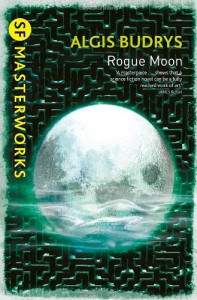 A piece of classic SF with an intriguing premise that explores some of my favourite themes but for me seemed to lack focus and was distracted by pointless character interactions and conversations.
A piece of classic SF with an intriguing premise that explores some of my favourite themes but for me seemed to lack focus and was distracted by pointless character interactions and conversations.Many a time I've pondered what really happens to you if you were teleported from one location to another, the original you destroyed but your exact molecular structure accurately recreated in the target location. How would you really know you were still who you were before after the event? All you would have are your memories which might have been changed in subtle ways not objectively verifiable to anyone else. What about if more than one copy of you was recreated, which is the real you and which should go back to living your life afterwards.
These questions (and more) are at the centre of this book in a story set in 1960 in which although we haven't yet managed to fly people to the moon, we are able to teleport there. A strange artefact is discovered on the dark side of the moon that kills all who enter it if they breach a seemly pointless set of rules that they can only discover by trial and error. Ed Hawks, who's heading this exploration of the artefact, has come up with a mind blowing way of keeping people alive when they enter it, if only he can find someone who can keep their sanity after experiencing their own death...
My main problem with this book is there were pointless digressions as superfluous characters were introduced leading to many pointless conversations that did little or nothing to move the plot along or develop the characters that were central to the story. Often these conversations were hard to follow which didn't help. These formed such a large portion of the book that it has to bring down my rating of an otherwise fine story.
To sum up, a great story that was significantly flawed.
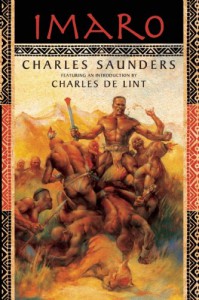 Inspired by [a:Robert E. Howard|66700|Robert E. Howard|http://d.gr-assets.com/authors/1210954603p2/66700.jpg]'s sword and sorcery stories but disappointed by the lack of fantasy stories set in Africa, with black heroes and with an appreciation of the rich diversity of the continent's cultures, Saunders decided to write his own. And I have to say, what a fantastic job he did.
Inspired by [a:Robert E. Howard|66700|Robert E. Howard|http://d.gr-assets.com/authors/1210954603p2/66700.jpg]'s sword and sorcery stories but disappointed by the lack of fantasy stories set in Africa, with black heroes and with an appreciation of the rich diversity of the continent's cultures, Saunders decided to write his own. And I have to say, what a fantastic job he did.We follow Imaro from his mysterious and humble beginnings through his coming of age and his travels across a semi-mythical Africa as he meets friends, lovers and enemies, as eventually he discovers that he is but a piece in a deadly game between rival spiritual powers.
I was gripped throughout and it was a pleasure to read. If you like the style of authors like Howard but can't stomach the racist undertones, or simply just want to read brilliant action packed heroic adventures, you really don't want to pass this by. Thank goodness the author was persuaded to bring the stories back into print (in an albeit revised form). I just can't wait to read the sequel.
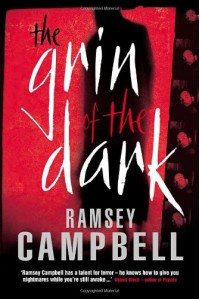 Campbell is one of the long established masters of the genre although he is less well known and widely appreciated than other long established authors. Although widely respected by other writers in the field, he is never going to enjoy the popularity of others, such as King, because his characters are not as easy to relate to, his narrative style sometimes jars and his plot lines often fail to wrap up conclusively. He employs a graduated build up of unease that some readers might not have the patience for and his terrors are generally of a more ambiguous and nebulous nature that some might find frustrating.
Campbell is one of the long established masters of the genre although he is less well known and widely appreciated than other long established authors. Although widely respected by other writers in the field, he is never going to enjoy the popularity of others, such as King, because his characters are not as easy to relate to, his narrative style sometimes jars and his plot lines often fail to wrap up conclusively. He employs a graduated build up of unease that some readers might not have the patience for and his terrors are generally of a more ambiguous and nebulous nature that some might find frustrating.This is the most recent work of his I've read and is no exception to the above. In fact, this is even more gradually and carefully developed than any of his stories I have read before. The precise nature of the menace is never clearly defined throughout. There is a lurking threat that never quite crystallises to something tangible that the reader can grasp hold of. And at the end it the reader is left wondering whether the protagonist has himself truly grasped it or merely become its victim, another agent it is using to further its aims.
Campbell has not shied away from modern themes, exploring the way people interact with strangers on the internet, the way that the internet is becoming the way we define truth even though on-line information is constantly changing and is being changed. By subverting information on the internet one can subvert our notions of truth, society and even others sense of who they are. The boundary between on-line and physical reality is breaking down. Does this make the internet the ultimate tool for a malevolent agency to pursue its nefarious aims?
A must read for all Campbell fans and/or fans of subtle, cosmic horror.
 Another top notch edition from Tartarus reproducing one of the authors many out of print collections with an introduction by [a:Michael Dirda|72583|Michael Dirda|http://d.gr-assets.com/authors/1325973240p2/72583.jpg].
Another top notch edition from Tartarus reproducing one of the authors many out of print collections with an introduction by [a:Michael Dirda|72583|Michael Dirda|http://d.gr-assets.com/authors/1325973240p2/72583.jpg].As for the stories themselves, not among my favourite of his stories I have to say. This was my second reading of everyone's worst Aickman story; "Growing Boys" and I have to say that it did improve somewhat upon my second read. This time I noticed some of the subtler points of interest that I missed first time. No doubt that is true of most if not all of his stories and might well be the case for "Residents Only" and "Wood" that shared a sense of black humour yet I didn't quite see what the author was trying to achieve with either.
The stand out stories for me were "Marriage" and "Compulsory Games". Both deeply effective and moving; simply Aickman at his best. There were also two shorter, minor pieces: "Raising the Wind" and "Le Miroir".
All in all, a must for Aickman completest but not somewhere to start if you are new to the author.
 Right then, I think I've read just about enough of this. I still have some 90 odd pages left to go and I may dip back in again at some point should the fancy take me but that's enough for now.
Right then, I think I've read just about enough of this. I still have some 90 odd pages left to go and I may dip back in again at some point should the fancy take me but that's enough for now.As it is, it's taken me around six months to get this far. It's something I often find with these Wordsworth editions, you have to dip in and out of the collection, not attempt to read them all at once. And this one is no exception, there's a huge number of stories in here featuring a wide range of themes. It certainly serves to demonstrate Crowley's versatility as a writer. Personally though, I would have prefered a far more condensed and carefully selected collection.
One has to wonder just who this collection is aimed at. I can't imagine who else would pick up one of these editions if it wasn't merely to try the author, to sample their wares as it were. That's certainly why I picked it up at least. I was expecting more of a focus on his supernatural/weird fiction and many of the stories left me wondering why they were even in this collection.
That said, there are some wonderfully effecting and terrifying stories in here. "The Testament of Magdalen Blair" being one of the finest examples of these. The trouble is, they were lost, like needles in a haystack. I would find maybe one story in five of the kind I was interested in. The others weren't necessarily bad, just not of interest to me.
So, I'm not sure I would recommend this collection in particular to anyone but I definitely feel that Crowley as a writer has a lot to offer the fan of classic horror. Certainly there are gems in this collection but you will have to read through a lot else besides.
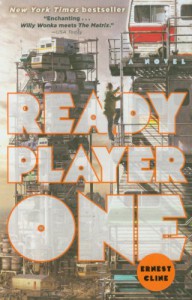 I didn't know whether I would enjoy this, whether it would rely too heavily on the reader deriving all their pleasure from spotting references to their favourite classic arcade games, books, films, tv and music. But there is actually quite a good story in here too and very entertaining at that.
I didn't know whether I would enjoy this, whether it would rely too heavily on the reader deriving all their pleasure from spotting references to their favourite classic arcade games, books, films, tv and music. But there is actually quite a good story in here too and very entertaining at that.I found it a bit of a stretch to believe that this teenager could have devoted the necessary time in five years to have completely memorised the scenes of so many films, the lyrics of so many songs, read so many books and mastered so many games. Even if he did have 12 hours a day to devote to such a task. However, I didn't let this scepticism get in the way of my enjoyment of the book.
One factor that might affect how much you like this story is how much you buy into it. Could so many of us be living in a shared virtual world, voluntarily, because it seems so much better than the real world in only a couple of decades from now? The prospect of a looming energy crisis and soaring land costs in an ever more overcrowded world seems all too believable. If the conditions for most people's lives deteriorated so much and the technology to make the online virtual experience so much more immersive were available wouldn't most people spend every waking moment hooked up? Seems plausible to me.
And in such a world, can we have real, genuine friends? Can we really know someone until we have actually met them in real life? Or does knowing people only by their avatar help eliminate discrimination and prejudice?
A classic story of one man's struggle against ruthless corporate greed.
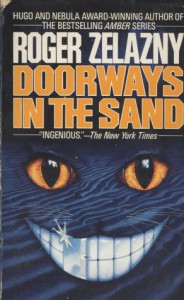 Do you know those books that drop you in at the deepend, something major is happening right away but you don't know what's going on and the words are a meaningless jumble until you gradually start to make sense of what's happening? Well, this book's like that at the start of every single chapter.
Do you know those books that drop you in at the deepend, something major is happening right away but you don't know what's going on and the words are a meaningless jumble until you gradually start to make sense of what's happening? Well, this book's like that at the start of every single chapter.Even though this book is a single narrative thread, the plot lurches forward with each chapter, often in some seemingly bizarre cliffhanger situation that you have no idea how it came about. The narrative then backtracks filling in the blanks and relieving the reader's confusion. Pretty soon the novelty of this approach began to wane and it became a little tiresome.
The story was okay. The protagonist, a perpetual student who runs about on rooftops for fun, unwittingly gets embroiled in a interstella conspiracy that threatens earth's place a new galactic order. Everyone thinks he is in possession of a precious alien artifact but he doesn't know anything about it...or does he?
My favourite bit was when he went in went through an inversion machine that switches his body from left to right, down to a molecular level. His perception was inverted and even food and drink tasted different because of flavours being affected by the asymmetry of their molecular makeup.
But overall nothing particularly special and one I will likely quickly forget.
 Well, this is certainly one for the Howard completists. Not that it is only such readers who would be interested in this. It is also great for those who just want to read about another of Howard's characters, those who want a change from Conan, although of all of them Kull is probably the most Conon like. If one ignores the various incomplete fragments and unfinished drafts, most of these stories are top notch, up there with his best work.
Well, this is certainly one for the Howard completists. Not that it is only such readers who would be interested in this. It is also great for those who just want to read about another of Howard's characters, those who want a change from Conan, although of all of them Kull is probably the most Conon like. If one ignores the various incomplete fragments and unfinished drafts, most of these stories are top notch, up there with his best work.These are stories of Kull, of Atlantis, barbarian and savage who usurped the Valusian throne and then found out that holding onto it was a lot harder than taking it in the first place. Aided by a few trusted advisers and his Pictish allies, he endeavours to resist all efforts to unseat him.
Apparently, only three stories featuring Kull were published during Howard's lifetime. A handful of others were found and published in the 60's. All these are collected here, along with the aforementioned incomplete fragments, and arranged in the order that they were written. Throughout, almost on every page, there are hand drawn illustrations to accompany the text and illustrate the story. There's also a good introduction, an informative appendix and notes on the text used in this volume.
I probably wouldn't advise starting with this character if you are new to howard, but if you have liked any of his other work, it is worth giving this one a read.
The Quiet Woman
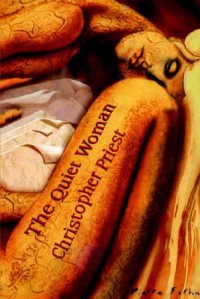 Towards the end of this book, when the protagonist Alice finally manages to drag out of her antagonist George some kind of explanation as to why her manuscript has been seized, she is told this:
Towards the end of this book, when the protagonist Alice finally manages to drag out of her antagonist George some kind of explanation as to why her manuscript has been seized, she is told this:"The depiction of characters is sketchey, and only the most shallow of motives are attributed to them to explain their actions[...]The text changes direction unexpectedly[...]Parts of the story appear to have been left out. There are implausible coincidences. You seem anxious to explain many things, but the reader is left unsatisfied[...]At the end of the book there is a feeling of dissatisfaction, a sense that the book has been leading nowhere, that it is an artificial construct with no adequate purpose."
The above criticisms might well have been leveled against the very book one is reading and, one feels, the author's intended effect.
So then, one shouldn't approach this book expecting anything like a conventionally written novel or they will be heavily disappointed. But people don't approach Priest's work expecting that, do they? Let's just say I wouldn't suggest this book as a place to start with his work. But to one seasoned with Priest's writing, one will find an exploration of familiar themes that he has explored many times elsewhere, but in a new and intriguing way.
There are hints throughout the narrative that suggest that Priest might be casting himself as the protagonist and that this is in some way autobiographical but we are also warned that any truths will be wrapped in deceptions and contradictory points deliberately included. And are there not some aspects of the antagonist that we might imagine the author also relates to? And how much of Tom's conspiracy theories reflect the author's own view of Britain and the way it is developing?
A befuddling novel that will leave the reader pondering it's meaning for some time afterwards.
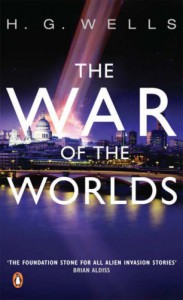 Coming to a book that you've not only heard so much about before hand, but pretty much know what happens due to countless adaptations in other mediums, I was worried it would disappoint. How could it possibly live up to expectations or offer me any surprises? However, an undisputed classic of the genre can only be ignored for so long.
Coming to a book that you've not only heard so much about before hand, but pretty much know what happens due to countless adaptations in other mediums, I was worried it would disappoint. How could it possibly live up to expectations or offer me any surprises? However, an undisputed classic of the genre can only be ignored for so long.The last Wells novel I read dampened my expectations somewhat but that was one of his more minor and less well remembered books ([b:When the Sleeper Wakes|80939|When the Sleeper Wakes|H.G. Wells|http://d.gr-assets.com/books/1320389128s/80939.jpg|3272171]). This is perhaps his most celebrated story and I have to say, after finishing it, I have to agree that it is magnificent, certainly the best of the three I have so far read.
I'm not sure if it was the first ever alien invasion story but if not, it must have been at least the first to present the idea in such a modern, stark way. An undeniable influence on [a:John Wyndham|36332|John Wyndham|http://d.gr-assets.com/authors/1343316104p2/36332.jpg] who explored similar themes around a half century later. Like Wyndham, Wells seeks here to upset our complacent and self-satisfied notions of being the masters of all we survey. Humans were top of the food chain, and Britain was (perhaps) the most powerful nation in the world (at the time). Where better then than for the aliens from Mars to arrive than in England to demonstrate their power and ease at which they might overthrow humanity. We were to become the livestock to a new master species, at best rats hiding in the shadows, our cities no more than ant hills to be kicked over.
As with Wyndam's apocalyptic novels, Wells explores how disaster might reshape society, and how it changes human behaviour as civilization goes out the window. The collapse into despair and reversion to animal instincts are seen in the Curate. The ready abandonment of the old order and keenness to establish a new way of living we see in the artilleryman. Acts of bravery, cowardice, callous opportunism and self-sacrifice are all seen among those fleeing the rapid advance of the aliens.
This is a great story in it's own right and one need not make allowances for it's age. Okay, a lot of the science we now know to be a bit hokey and it is most definitely a period story. But when one considers when it was written, how far ahead of it's time it was and how much it defined the genre that didn't even exist at the time, one cannot help but call this the masterpiece it is.
The Stainless Steel Rat's Revenge
 Not long after finishing the first book in the series, I happened to stumble upon the sequel and happily picked it up. After how much I enjoyed the first book, I expected more great things from this.
Not long after finishing the first book in the series, I happened to stumble upon the sequel and happily picked it up. After how much I enjoyed the first book, I expected more great things from this.While it was still good fun, I didn't quite enjoy it as much as the first, and it did feel a bit more dated this time. If I see the next book I might pick it up, should I be in the mood for something light, but for now I'm quite happy to leave it there.
So long, "slippery" Jim.
The Day of the Triffids
 And so I finally read Wyndham's most famous novel, after reading most of his other novels first, hoping it would live up to my high expectations. Although having read his other work I've already seen he can be somewhat variable in quality.
And so I finally read Wyndham's most famous novel, after reading most of his other novels first, hoping it would live up to my high expectations. Although having read his other work I've already seen he can be somewhat variable in quality.Things are not looking good for humanity here. To start with nearly everybody's gone blind, then there's a mysterious plague sweeping the population and to top it all off, the triffids are on the loose stinging and devouring all who they can. Our protagonist Bill is fortunately in hospital with his eyes bandaged preventing him from seeing the cosmic display that blinded almost everyone else and at first his main problem is avoiding being snagged in the street by roaming blind people desperate to leash a sighted person to get food for them. Eventually conditions deteriorate further and Bill is separated from his beloved Josellyn and flees London looking for somewhere to set up a new life.
Initially the triffids aren't so much of a problem and seem almost incidental to the main story but increasingly they are a menace to the survivors as their numbers start to swell and they take over the country. Just how intelligent these carnivorous plants really are the reader is left to ponder, did they merely take advantage of the situation to prey on mankind or did they somehow instigate events? Or perhaps humankind was merely reaping what it sew, got its just deserts for its follies?
Quite a lot of issues were considered here. Just how much should responsibility for attempting to help the overwhelming numbers of blind people did the few remaining sighted have? How much can (or should) we cling on to our habits and moral values in the light of drastically altered social conditions? What sort of society should we attempt to construct from the ashes of the old?
And enjoyable and thought provoking read although falls short of being a masterpiece in my opinion because of a few minor quibbles I had. But all in all, well worth reading.
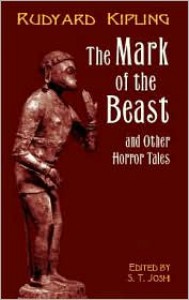 If you're like me then you wouldn't have realised that this famous classic author had ever written in the horror field. I hadn't actually read any of his work before and so it was high time I read something by him, this looked like a good place to start.
If you're like me then you wouldn't have realised that this famous classic author had ever written in the horror field. I hadn't actually read any of his work before and so it was high time I read something by him, this looked like a good place to start.The stories are presented in chronological order and hence there's a definite sense of change and progression reading through them in order. In my opinion, we see the Kipling developing his skills as a writer and the stories generally improve as they go on. Also, later on there is a definite shift away from India as the setting, I suppose reflecting the fact that he moved away from India later on in life.
Some stories definitely left a stronger impression than others. Besides the unquestionably excellent title story, I loved "The Strange Ride of Morrowbie Jukes" in which an English officer accidentally falls into a sand trap in the desert and finds a community of scavengers living in it with apparently no way out. An interesting examination of human nature.
"The Wandering Jew" was a haunting tale of someone who is driven to try and gain extra days of life my travelling constantly eastwards around the world.
In "They" the protagonist, lost while driving, encounters a blind lady living in a house with mysteriously shy children. He eventually discovers they are not quite what they seem.
And in "The House Surgeon" we see a house haunted, not by the dead, by by the grief of the a living, tortured soul.
All in all, a pleasing collection in which the stories can be read back to back as they vary considerably and served up with an informative introduction by S. T. Joshi.
 This was a nice way of sampling E.M. Forster and I enjoyed both stories contained although they are very different.
This was a nice way of sampling E.M. Forster and I enjoyed both stories contained although they are very different.The first being a chilling, dystopian vision of the future, the other being a fantasy about a boy who finds a bus to heaven at the end of a blind alley opposite his house.
I enjoyed his writing style and look forward to trying some more of his work.
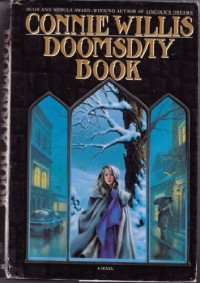 I felt a little bit of trepidation setting out to read this book. Firstly I was alarmed by it's size and then I was alarmed by some of the quite harsh criticisms of the book suggesting that very little actually happens. On the other hand, it is quite highly acclaimed by many and now featured in the SF Masterworks series.
I felt a little bit of trepidation setting out to read this book. Firstly I was alarmed by it's size and then I was alarmed by some of the quite harsh criticisms of the book suggesting that very little actually happens. On the other hand, it is quite highly acclaimed by many and now featured in the SF Masterworks series. Throughout most of the book I felt quite positive. I didn't find it boring or that not enough was happening. I felt quite caught up on the story and wanted to find out what happened next throughout. I did notice however that it started to drag a little in the middle. The narrative seemed to be needlessly and methodically plodding through minutiae and trivial details that did little to advance the plot or characters. Maybe the author wanted us to share the protagonist's sense of exasperation being beset by the selfish and menial concerns of others while they were just trying to get on and deal with the big issues. But I think she overdid it and most readers will just start feeling exasperated with the narrative itself.
The author had obviously done her research on the biological and historical aspects of the story. Her knowledge of life back in a thirteenth century English village felt well researched and her knowledge of diseases and pandemics felt convincing (to someone who professes no expertise in either subject). On the other hand the technological and social aspects of the story felt less well thought out. Although being set in 2050, it felt exactly like 1990 with the exception that time machines and video phones existed. Her failure to anticipate the rise to prominence of the mobile phone just a few short years after this book published is quite noticeable, particularly when so much of the narrative tension arises out of the communication problems that will seem silly to an audience so at home in an age of personal communications.
Ultimately the book was just too long for the story it had to tell. Even though most of it was split into two narratives that paralleled the experiences of a modern pandemic with an ancient one, it didn't really need to be as long as it was. And at the end, I felt slightly deflated, somewhat dissatisfied with the way it was all wrapped up. A good book but could have been better.
Drawing of the Dark (Mayflower books)
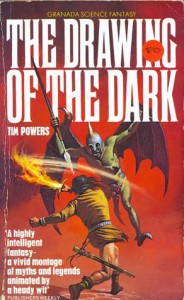 Never have I read a novel infused with so much drinking of beer! I could not turn a page, it seemed, when the protagonist Duffy doesn't quaff yet another tankard of ale. The very title itself refers to the drawing of the special, dark brew of beer that is performed once every few hundred years in order to invest the agents of the west with its magical, life enhancing properties.
Never have I read a novel infused with so much drinking of beer! I could not turn a page, it seemed, when the protagonist Duffy doesn't quaff yet another tankard of ale. The very title itself refers to the drawing of the special, dark brew of beer that is performed once every few hundred years in order to invest the agents of the west with its magical, life enhancing properties.Punctuating the relentless beer drinking is plenty of action; Duffy is beset by antagonists at every turn trying to thwart him and the cause that he is at first not even aware of. The author seems quite at home constructing action scenes that are well described and prevent boredom ever setting in.
So, those are the things I liked about the book. What I didn't like so much is the premise; of an age old struggle between east and west, this time manifesting itself in a crucial battle for Vienna by the Turks in the fifteenth century that, if successful, could lead to the ultimate triumph of east over west. Duffy get swept up in events, not because he's particularly interested in who wins, but because he is the latest incarnation of the great western hero who has been King Arthur (among others) in a previous life. Manipulated and coaxed by Merlin into taking part in the battle for Vienna, he reluctantly goes along with it.
There is an underlying humour to it all that occasionally made me chuckle and helps glue the narrative together, moving things along quite nicely but it didn't help the fact that I was still left feeling that the plot ambled along often without much direction and going down seeminglessly pointless digressions.
I did enjoy reading this book but overall I felt it was a bit too long and should have been a tad more focused. I'll leave you with the opening quotation from Tim's fictional poet William Ashbless that pretty much sums up what this book's all about:
"If but we christians have our beer, nothing's to fear."



